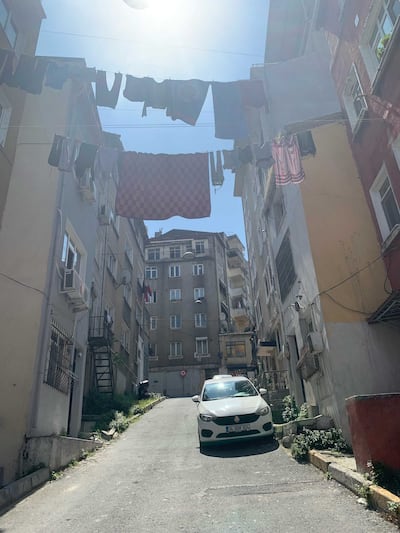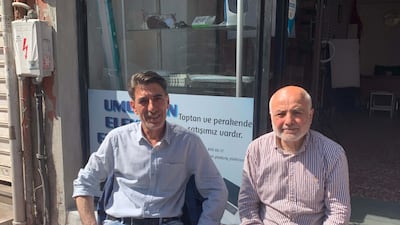As the finale of the Turkish presidential battle rapidly approaches, few subjects have made as many headlines as the status of Syrian refugees in Turkey.
Kemal Kilicdaroglu may have put on the most successful opposition campaign during Recep Tayyip Erdogan's 20 years in charge, but he still lagged behind the long-time leader in the first round, almost two weeks ago.
In an attempt to claw back the 5 per cent gap to the current president, the leader of the Republican People's Party (CHP) has quickly upped the rhetoric against the estimated 3.4 million Syrian refugees, promising to expel them while also courting far-right voters.
But for some Turkish voters, Mr Kilicdaroglu is missing the point.
Turkey is currently struggling with an economic crisis. Inflation soared above 83 per cent last October, a 24-year high, while the Turkish lira plummeted to record lows against the US dollar on Friday.
Tarlabasi is a run-down neighbourhood nestled a stone's throw from the famous Taksim street. It is home to a large mix of migrant communities who fled domestic and regional conflicts – Arabs, Kurds and Turks.
"Making politics about refugees is not useful for us," said electronics shop owner Nasip Kaplan, as he drinks tea at the start of his working day.
"It's not very logical to build all the campaign on Syrian refugees. We have many more issues besides the Syrians," said the 50-year-old, a supporter of Mr Erdogan's main electoral ally.
Mr Erdogan, who two weeks ago fell just short of the 50 per cent cut-off needed to avoid the second-round run-off, has taken a comparatively softer approach. However, his once-accepting rhetoric has somewhat changed recently and his government has begun the construction of nearly a quarter of a million housing units to resettle refugees in rebel-held northern Syria.
"It's more logical than Kilicdaroglu's propaganda," said Mr Kaplan, who added that candidates should instead focus on equality and the economy, and not "building their campaign on lies".
On the other side of the road is a shop belonging to Mr Kaplan's friend, Cevat Aydogan – a CHP supporter.
The latter argues that the influx of refugees was a result of Mr Erdogan's open-door policy in Turkey, and as such it should be an administration led by Mr Kilicdaroglu that helps them return – even if he doesn't necessarily agree with his approach.
And while Mr Kaplan and Mr Aydogan are likely to vote for different candidates on Sunday, they do agree on one thing: "When I am voting, the Syrian refugees' issue is not one of the elements that leads me to vote for someone. It doesn't matter to me," said Mr Aydogan, 60. "We want democracy and peace, it doesn't matter who comes to the post."
Nonetheless, anti-refugee sentiment is still high. Mohamed, 17, who gave only his first name, is a Syrian Kurd from Afrin, an area bordering Turkey. He works in Istanbul at a textile shop. He has lived in Turkey for 12 years and says he is much more fluent in Turkish now than he is in Arabic or Kurdish.

"I don't care what Erdogan or Kilicdaroglu say, because we have a plan to return to our village in Syria," he said from a cafe in Tarlabasi, where flags of the main parties fly on separate streets – a sign of the opposing political allegiances here.
Perhaps some of the less hardline views on Syrians in Karlabasi are due to the fact that it has historically been a neighbourhood for people fleeing conflict, and has a high population of Kurds who left south-east Turkey because of the conflict there.
"Kilicdaroglu is wrong to build his politics on Syrian refugees. As you can see, we live together. The Syrians are working like slaves in Turkey. They start in the morning and go home in the evening," said Ahmed Ihlan, a 53-year-old Kurd.
"Instead of talking about Syrians, his approach should be in a more equal way. Instead of building policies on Syrian refugees, if he made a speech or campaign talking about more equality, democracy and how he's going to run the economy it would be better for us – instead of being against Syrians," he added.
But Mr Ihlan's sympathy for Syrian refugees is not prevalent in Karlabasi. Ahmed, 74, said that "Syrians must go," called them traitors and blamed them for rising rent costs
"Of course this [the anti-refugee rhetoric] is one of the elements that led us to decide to return," said Syrian refugee Mohamed "We can't live like this, always in a stress, waiting for decisions by the government."
Whatever residents of Karlabasi feel about refugees, other priorities are likely to take precedence when they head to the polls on Sunday.
Mr Erdogan, the leader of the ruling Justice and Development Party (AKP), has been accused of using non-traditional economic policies that have only worsened the financial situation.
Asked why he would vote for Mr Kilicdaroglu and not Mr Erdogan, Nehmet, 61, gave three reasons for and against. He blamed the AKP for exacerbating inequality, nurturing corruption and for damaging the economy.
For the CHP he said: "They will raise our minimum wage, send the foreign immigrants home, and he will treat us equally."










